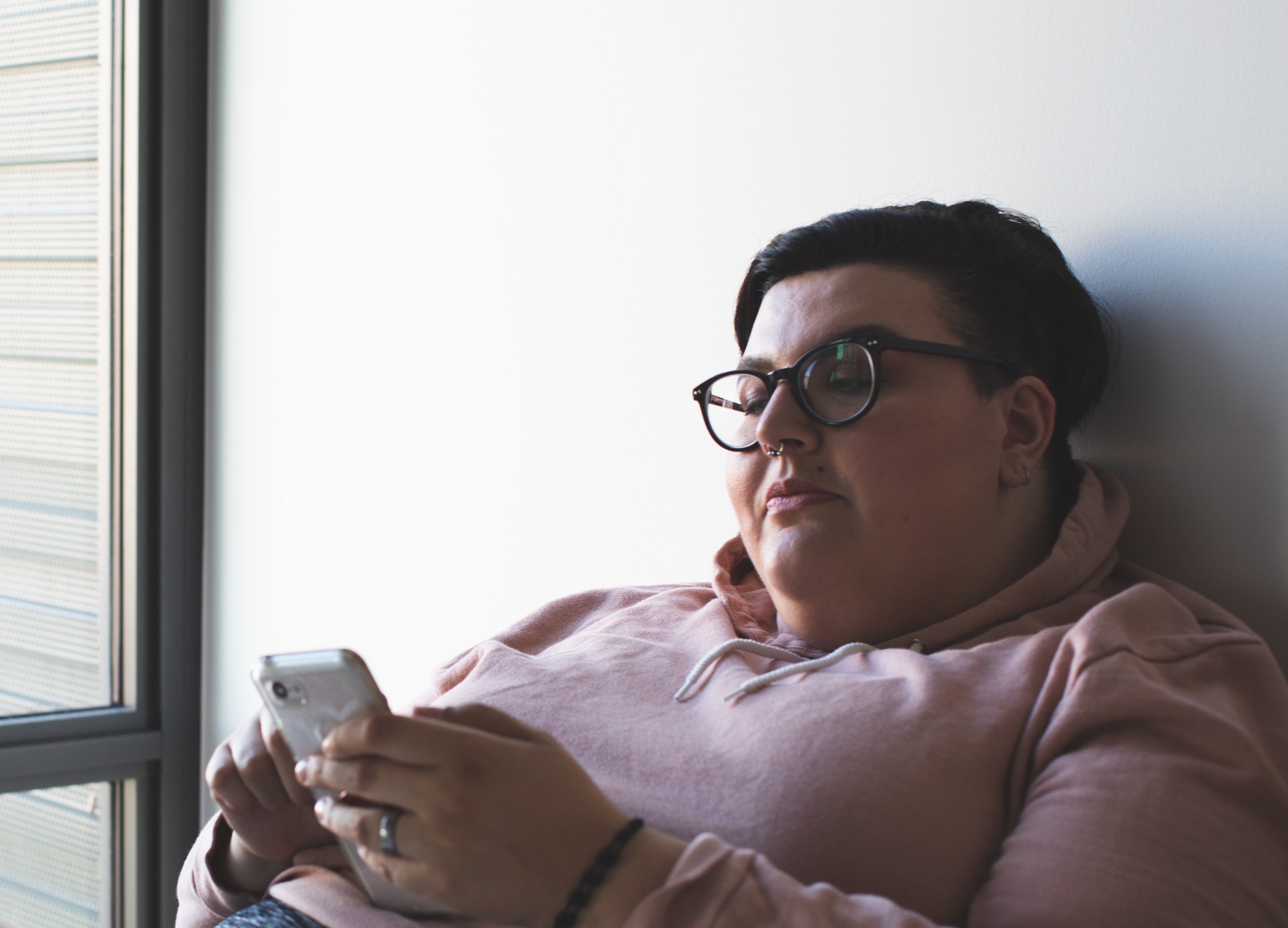
Navigating Sex With Chronic Pain, According to Spoonies & Sex Educators
A while back we asked some of our community members who experience chronic pain and/or limited mobility to share some of their experiences with us. Jamie J. LeClaire, a freelance writer and sex educator living with chronic illness interviewed a few of them as part of this article. We hope this piece is useful, not only to people with chronic pain, chronic illness or limited mobility but also to anyone aiming to be a more informed partner.
.......................................................
Navigating sexuality when you’re struggling with chronic pain, chronic illness or any sort of limited mobility is not an easy (or inexpensive task), by any means. It is a difficult dance, this complicated waltz of finding pleasure through the pain, full of stumbles and missteps, but for many, it is ultimately a very worthy and fulfilling pursuit.
I’ve been a sex educator and a highly sexual person for much longer than I’ve been living in a body with chronic illness and it has had a profound impact on my sexual confidence and sexual autonomy, as well as the way that I approach sex ed. For me, what has been the most healing and transformative so far, has been all that I’ve learned from directly from peers, #spoonie social media, Tumblr, and incredible, passionate disabled sexuality professionals. So, I spoke with a few fellow #spoonie Nox Shop-ers for some firsthand experience and a sexuality educator who specializes in sexual pleasure for individuals with chronic pain and disability, for some guidance on navigating sexuality with chronic pain, safely and shame-free.
First, reframe and expand your understanding of sexuality
One of the most important things about approaching sex with chronic pain is to work to reframe and expand our assumptions of sexuality, intimacy, and intercourse. Cultural narratives and media portrayals of sexual encounters are often grossly inaccurate and perpetuate cis-heteronormative, ableist narratives of sex, but there is a world of opportunities for pleasure beyond penetrative and/or PIV (penis-in-vagina) sex.
Katherine O’Connell, a sexuality educator and person with chronic pain, speaks to this further, “there are millions of possibilities of what sex and sexual pleasure can be, but people can get really caught up in normative definitions of sex. A lot of folks have already said screw that, it's not the only type of sex in the world. We have the power to define what sex is for us”. From sensation play to exploring erogenous zones, to incorporating toys and deprioritizing penetrative sex… this necessity to “queer” sexuality can be a rewarding opportunity to explore more of your capacities for pleasure and sensation. O’Connell attests, “that process can be frustrating and trial-and-error, but it can also be fun and hot as hell”.
Be patient and gentle with yourself
It can be easy to become frustrated with our bodies and try to push back against the limitations of our chronic illness. However, we have to approach our bodies and our sexual re-learning with patience and gentleness, which is ultimately more rewarding. O’Connell, who herself suffers from chronic pain, speaks to this mindset shift, “I can be so frustrated when "my body doesn't work the way it's supposed to,” while it can be upsetting and difficult, I'm learning to be kind to my body and not be angry or punish myself when I can't do something I want”. Gina B. (she/her), who lives with chronic pain, advises, “talk to your body, find out what is comfortable, pleasurable, and give yourself time to enjoy learning these new things”.
Becoming patient and understanding with yourself and your sexuality will ultimately help your relationships as well. Gina continues, “It took time for me to be clear about what I needed and wanted, but it's worth it to feel physically and emotionally comfortable with someone”. Wolfe (they/them), also living with chronic pain, agrees that with partnered sex, your comfortability should be just as important and prioritized. They explain, “with partners, I've had the best experience by being choosy, and only having sex with people who listen and care about my comfort, who adapt to what I'm capable of at the time”.
Planning ahead is necessary; de-prioritize ‘spontaneity’
Finding time for enjoyable and pain-free/low pain sex, if it is important to you, requires planning. Physically, depending on your needs and your abilities, this might look like planning sex around specific medications, or planning sex around certain times of the month, and that’s totally okay. You might want to engage in pain-relieving activities prior, like taking a bath or a nap or getting a massage, or using CBD or CBD/THC products if they are helpful for your pain. Maybe it means you need to prepare assistive devices, warm up a heated pad or blanket, or set out pads for easy clean-up.
Planning ahead for partnered sex is critical as well. Prepare yourself, and your partner, by telling them what your boundaries are, discussing which positions are safest/most comfortable, talking about what is off-limits, figuring out a safe-word or safe sign for when you are in pain (and not in a good, kinky way), asking specifically and explicitly for what you need.
A fun and empowering way to do this, especially if you’re actively dating new partners, is to grab some paper, markers, and stickers, and create a “guide to getting it on”, an idea introduced through an episode of The Cut’s online series, Sex Probz, by sex educators Lola and Francisco. List the most important things new partners should know before having sex with you… your needs, your boundaries, your limitations, as well as ways your partner can support you.
Embrace & incorporate sex toys, accessories, and assistive devices
Finding practical easy-to-use sex toys that make your experience comfortable and enjoyable is so important. There are some sex toy/sex tech companies that aim to reconcile the lack of accessible pleasure products and increase the visibility and public conversation of disabled people and sexuality, addressing the nearly 13 percent of people living with disabilities (reported) in the U.S.
Keep in mind, there is no universal “miracle toy” because we are all so unique, so take the time to find toys and accessories that really work for you and your specific needs. Gina shares her experience, “my first toy was SO helpful! My hands didn't cramp up, it was flexible and could do exactly what I needed it to do”. She assures us, “after working in an adult toy store, I now see how many options there really are, and how creative you can get”.
If you experience joint pain, loss of feeling in limbs, etc., try finding toys that offer a comfortable grip, a long handle, or don’t require a grip at all. We suggest the VeDO yumi, the rechargeable Magicwand, or, the hands-free WeVibe Moxie that attaches to your underwear magnetically.
Non-pelvic harnesses, such as thigh harnesses, boot harnesses, and chin harnesses also expand our options for penetrative sex.
A shining star for those with pelvic and vaginal pain has been the OhNut. The interlocking comfortable, stretchy rings that act as a wearable penetration buffer, offers a practical solution for folks who experience painful penetration, often caused by chronic illnesses such as pelvic disorders, PCOS, endometriosis, atrophic vaginitis, IBS and bowel issues, and more, by controlling the level of penetration whether by a penis or a dildo.
To find what works for you, Ami suggests going to visit a local sex shop in person. “See what kinds of creative things you could do with what already exists”, she shares. You also have the opportunity to speak to trained employees.
Remember, pleasure is a human right
Living with chronic pain doesn’t make someone any less deserving of exploring an active, healthy, evolving sex life. Everyone is equally deserving of pleasure and sexual intimacy. O’Connell emphasizes this, “your needs aren't secondary to a non-disabled person. Any boundaries you set are good and valid. You deserve to have the kind of sex you want to have, and not be guilted or shamed by partners. You, and your body, and what you want to do are sexy, and you're enough”.
Ami echoes this sentiment, “don't compare yourself to your able-bodied counterparts. Listen to your body, listen to your desires, and figure out how to connect the two. Sex looks different for everyBODY”.
Remember, we all deserve to experience and celebrate their sexuality safely, accessibly, and shamelessly, in whatever body we have, if we so choose. The pursuit of sexual pleasure is not reserved for the able-bodied, it is allowed to be important to you, and you are allowed to prioritize it.
Jamie J. LeClaire (they/them) is a freelance writer and sex educator living with chronic illness. Their work and writing focus on sexual health and wellness, queer and trans identity, body politics, nonmonogamy and more. You can find out more about them and their coaching, speaking, and workshop offerings on their website or follow them on Instagram at @JamieJLeClaire.



